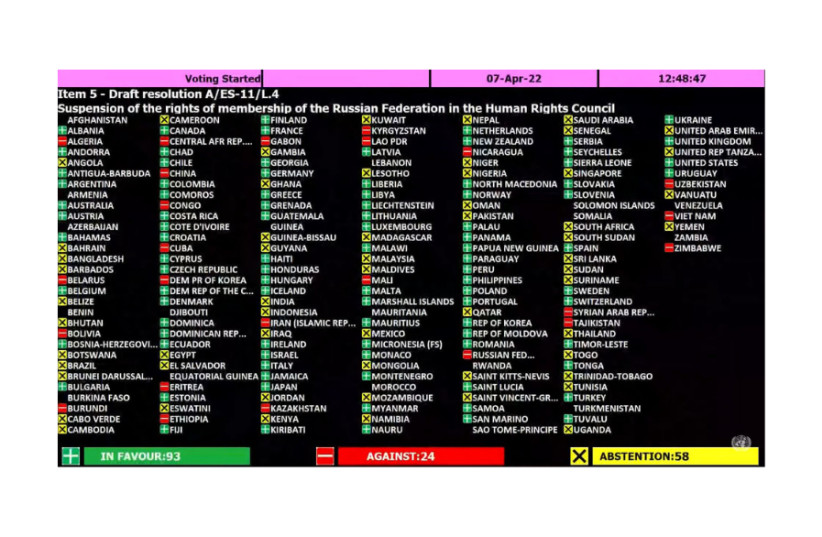The United Nations General Assembly voted to suspend Russia from the Geneva-based Human Rights Council on Thursday with the US-led push garnering 93 votes in favor, while 24 countries voted no and 58 countries abstained.
Russia said on Thursday that a vote by United Nations member states to suspend it from the UN Human Rights Council was illegal and politically motivated, the RIA news agency reported.
RIA also quoted Gennady Kuzmin, Deputy Russian Ambassador to the United Nations, as saying Russia had decided to give up its membership immediately, on April 7.
"The vote today does not change our position on the UN Human Rights Council, which is an extremist, morally flawed, biased and essentially anti-Israel body that has been exploited since its inception by the main countries violating human rights in the world as a political tool, including to attack Israel," said Foreign Minister Yair Lapid on Thursday.
The draft text expressed "grave concern at the ongoing human rights and humanitarian crisis in Ukraine," particularly at reports of rights abuses by Russia.
Explaining the move, announced on Monday, US Ambassador to the United Nations Linda Thomas-Greenfield told Reuters: "It is important to say (to Russia) 'we're not going to allow you to continue to act with such impunity and pretend that you respect human rights."
Russia has warned countries that a yes vote or abstention will be viewed as an "unfriendly gesture" with consequences for bilateral ties, according to a note seen by Reuters.

Since Russia's invasion of Ukraine began on Feb. 24, the Assembly has adopted two resolutions denouncing Russia with 141 and 140 votes in favor. Moscow says it is carrying out a "special operation" to demilitarize Ukraine.
The United States announced it would seek Russia's suspension after Ukraine accused Russian troops of killing hundreds of civilians in the town of Bucha.
Russia denies attacking civilians in Ukraine. UN Ambassador Vassily Nebenzia said on Tuesday that while Bucha was under Russian control "not a single civilian suffered from any kind of violence."
Russia is in its second year of a three-year term on the Geneva-based Human Rights Council, which cannot make legally binding decisions. Its decisions send important political messages, however, and it can authorize investigations.
Last month the council opened an investigation into allegations of rights violations, including possible war crimes, in Ukraine since Russia's attack.
